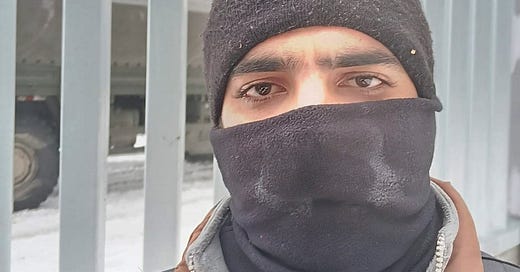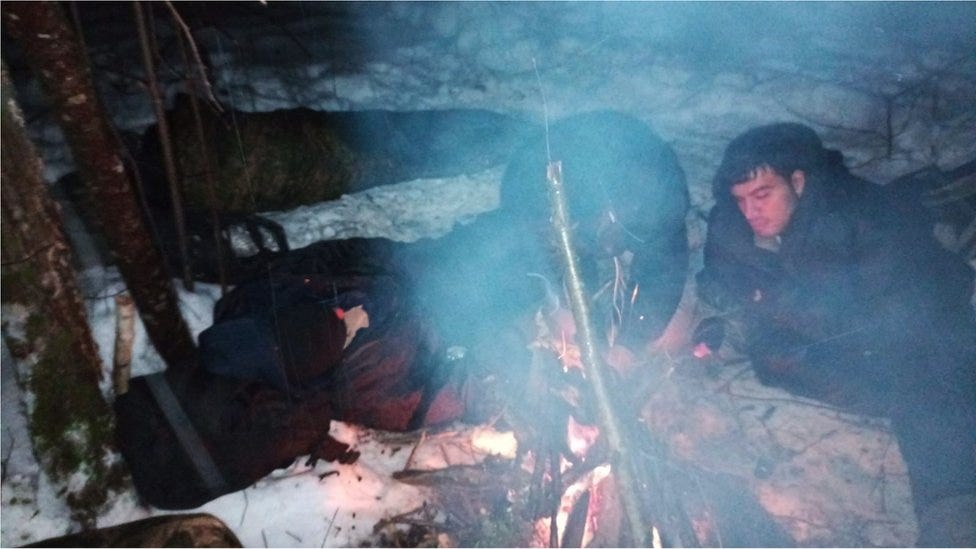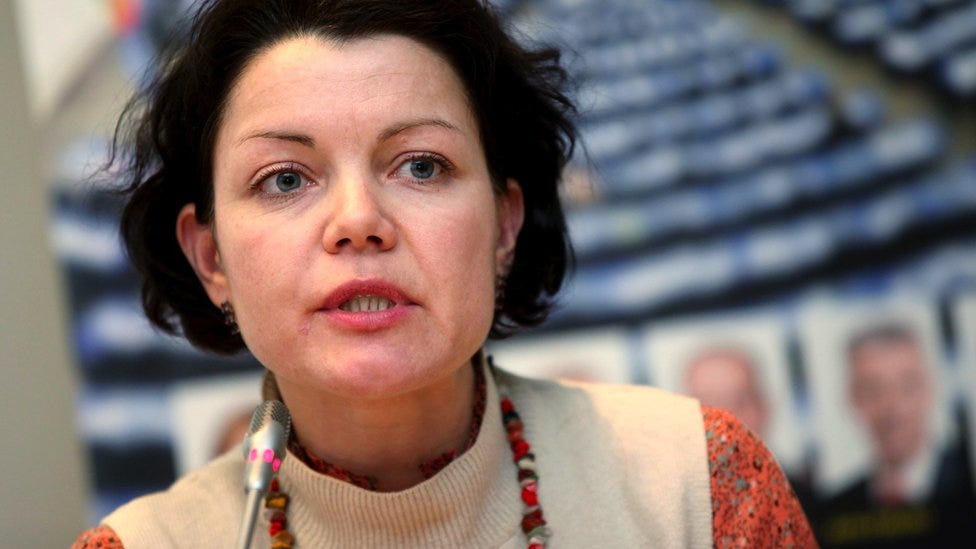The deadly journey to Europe: 'Six cigarettes were put out on my body'
Migrants trying to reach Europe describe the horror of being stuck for weeks or even months in heavy snow as border officers push them back and forth.
By Oksana Antonenko, BBC Russian, & Lina Shaikhouni, BBC Arabic.

"When I remember those dark days in the forest, I get traumatised," Syrian asylum seeker Abdulrahman Kiwan tells the BBC in a call over Zoom.
It was only a few months ago, on a cold December day. He was surrounded by heavy snow and had collapsed from exhaustion, with little hope of survival.
"I couldn't do it anymore. My injured leg could no longer take it," says Abdulrahman.
He had been walking for weeks in the forest separating Belarus from European Union member Latvia. Border guards on both sides kept pushing him back and forth between the two countries in eastern Europe.
He says reaching Europe was a "journey of death" but it was one he had to take as he was fleeing war in Syria.
And with limited movement due to a war injury in his leg, Abdulrahman needed a relatively easy route to Europe.
A plethora of posts on Facebook from unverified accounts in Arabic advertise visas to Russia and a route facilitated by smugglers through Belarus.
His friends had already made the journey. They told him it was his best option but the reality proved much more grim.
A tale of two borders
After three failed attempts to cross irregularly from Belarus into European Union member Poland in November, Abdulrahman and several others then tried to reach Latvia, also in the EU.
They walked dozens of kilometres in around 30 inches of snow through the forests, with little food and drink.
"We were shaking from the cold. When we walked, we warmed up a bit. But when we sat down we felt our clothes drenched from the snow," says Abdulrahman.
When they ran out of water, they sucked the liquid out of snowballs to keep hydrated.
"We were left hopeless. We even sent messages to our families asking them to forgive us as we didn't think we'd survive," he adds.
Issam is another Syrian who was with Abdulrahman for parts of his journey.
They both spent weeks stuck in the forest. As soon as they crossed into Latvia, border guards would push them back to Belarus, and vice versa.
"We kept telling [Latvian officers]: 'Belarus border guards are not allowing us to go back to Minsk, and you are not letting us into Latvia, what do you want us to do?'” says Issam.
In Latvia, border guards detained them in a tent, which both Issam and Abdulrahman describe as "dirty" and "crowded". Abdulrahman estimates it was located a few hours away from their main office towards the Belarus border.
They say people can spend anywhere from a few hours to a couple of days or even months in the tent before they are escorted back across the border.
"It had no toilets, no water or anything. We were not allowed to leave the tent without permission," says Issam, who described their treatment as "humiliating".
Allegations of violence
Abdulrahman says officers beat him with stun batons on his injured leg in the tent in Latvia. He was then pushed back across the border. On his third attempt to cross, he lost consciousness.
When Abdulrahman woke up, he says soldiers in the tent "pinned him down and put out six cigarettes on his injured leg."
Abdulrahman says he was held for around two weeks in the tent. When his health deteriorated in early January, he was eventually taken to a nearby hospital in Latvia.
Issam also says he was beaten by border officers. He says he saw Latvian soldiers beating a 16-year-old boy and a young woman who pleaded with them to be allowed into the country.
"When I confronted them and asked them why they were hitting [the woman], they beat me. A guard kicked me with his foot," says Issam.
Hybrid warfare?
The issue of migration in the wealthy 27-member economic and political union has been divisive for years.
The border between the EU and Belarus is the latest flashpoint.
Ever since Brussels sanctioned Minsk after disputed presidential elections in 2020, relations have deteriorated.
EU countries accuse Minsk and its ally Russia of using migrants as tools of "hybrid warfare".
Latvia considers migrants as a "weapon of war" who should be pushed back across the border for security reasons. It says it has prevented 10,524 attempts by migrants to illegally cross from Belarus since August 2021.
"Protecting the external border of Latvia and the European Union is our primary duty," the Latvian Interior Ministry said in a statement to the BBC, adding that it is under no obligation to accept all those who cross illegally.
The ministry denies any wrongdoing or mistreatment of migrants prevented from entering the country.
"Humanitarian assistance, including the necessary medical assistance, is provided to people prevented from illegally crossing the state border," the statement says.
Criminal case against volunteers
Although many in Latvia support the government's decision to push back what they describe as "illegal migrants" to Belarus, some are trying to stop it.
Ieva Raubishko is one of them. She has been helping migrants from the Middle East, especially those who find themselves trapped between the Latvia and Belarus border.
When Issam and his group were desperate, they contacted volunteers for help, who then filed a case with the European Court of Human Rights.
The court issued an interim or urgent measure forcing Latvia to temporarily receive the migrants and provide them with humanitarian assistance. Ieva and a colleague then rushed to the border to make sure Issam and his group were not pushed out of the country.
"We waited for two hours," says Ieva. "We weren't sure if they would make it but they did. They fell down on the snow, one was shaking. We were shocked."
But a state of emergency in the area since 2021 means that neither volunteers, journalists, nor international organisations are allowed to the border area without special permission. Ieva and her colleague Egils were there illegally.
Now, they both face a criminal lawsuit, accusing them of helping migrants cross into Latvia illegally.
Ieva thinks there could be a good side to the lawsuit. "Our criminal case made more people speak out in support of migrants… people who had been silent until now."
"If we don't give these people the opportunity to legally apply for asylum, illegal trafficking will only increase," she adds.
Abdulrahman has now made it safely to a European country. He does not want to disclose his exact location for security reasons.
Issam started his asylum procedure in Latvia but soon left for the Netherlands where his brother lives. He is grateful to Ieva for her help, but does not want to return.
"How can I go back to a country that treated me so harshly?" says Issam. "They beat us up and treated us in a very barbaric way."
Both Issam and Abdulrahman say they now regret taking the difficult journey through Belarus.
"I swear we were happy in Syria. But I fled war and a difficult life," says Issam. "Where should I have gone? This journey of death was my only chance."
Read this story in Russian here.







